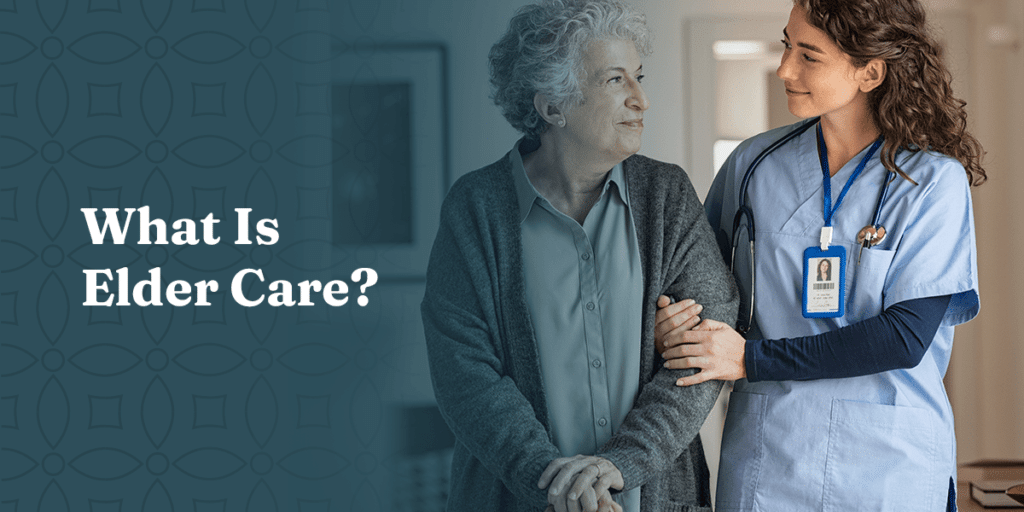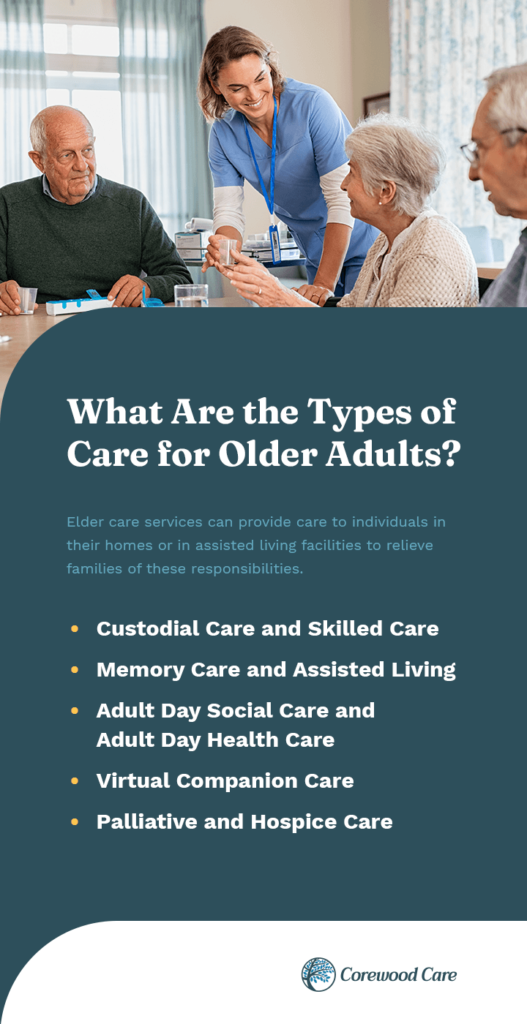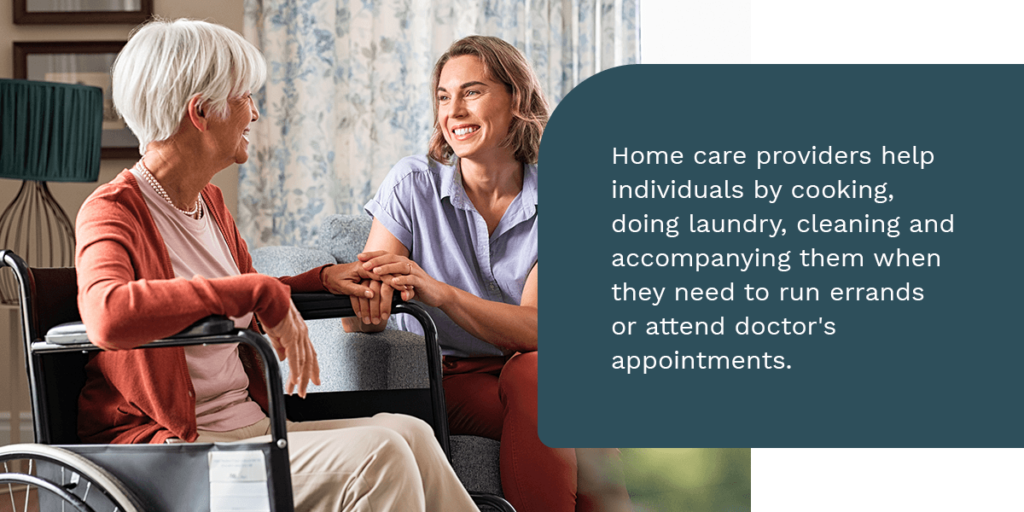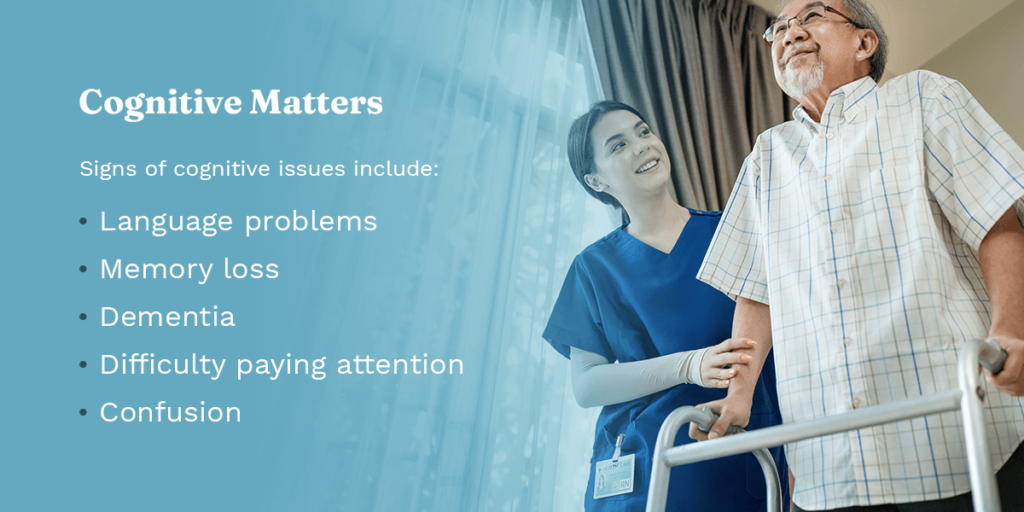What Is Elder Care?
Table of Contents

Elder care service is specialized care intended for adults aged 65 and over. This type of care provides assistance to individuals as they transition into later stages of life. Some individuals may need help completing daily tasks like meal prep, personal care, or light housekeeping in order to live independently and safely while others may need hands skilled care. Some people may simply need companionship to fulfill emotional needs.
The level of care depends on one’s physical, mental and emotional health along with their individual needs and preferences. Older adults can receive elder care services in communities, facilities or in the comfort of their own homes.
How Does Elder Care Work?
Older adults may face mental and physical difficulties that prevent them from performing their regular Activities of Daily Living (ADLs). Elder care is a service that helps them with these challenges. Experienced healthcare professionals, hired care providers and even family members, can assist older adults in the recipient’s home or in more formal settings, such as memory-care facilities, full-service skilled nursing facilities or assisted living communities.
Older adults will receive different types of care based on their needs. Some people have debilitating or chronic conditions that require more hands-on care and attention than others. Many older adults need assistance due to memory loss. Some people may only need a little help remembering to take their medicine at the correct time each day, while others might struggle more with their memory and find themselves in unsafe situations. They might forget important tasks such as taking food off the stove.

What Are the Types of Care for Older Adults?
Older adults require different types of care depending on their physical, cognitive and emotional functioning. Some individuals require medical care for physical impairments or health conditions while others simply need help with basic tasks around their house or assistance running errands. Families are sometimes able to provide care for older adults, but this responsibility can strain their work schedules and other aspects of their lives.
Elder care services can provide care to individuals in their homes or in senior living communities to relieve families of these responsibilities.
Custodial Care and Skilled Care
Custodial care/Personal Care refers to non-medical care while skilled care refers to medical care. Custodial care/Personal Care provides older adults assistance with activities of daily living (ADLs) such as eating, bathing, showering, getting in and out of a chair or bed, toileting, walking and dressing. Custodial care also provides older adults assistance with instrumental activities of daily living (IADLs) such as shopping, household chores, necessary business tasks and getting around for various purposes. Adults with dementia or Alzheimer’s usually need custodial care.
Skilled care provides older adults assistance with medical services such as administering IV medications, providing physical therapy and wound care. Only licensed or certified medical professionals can provide skilled care. Older adults can receive custodial care in an adult day care setting, at home or in a senior living community such as a group home for older adults, assisted living community or skilled nursing facility.
Memory Care and Assisted Living
Senior living communities may have residences with Memory care and assisted living. Memory care and assisted living provide residents with hands-on care and assistance. These communities also provide social activities, meals, medication monitoring, laundry, housekeeping, and a nurse on-site at all times.
Memory care is meant for individuals who have dementia from conditions such as Alzheimer’s, Huntington’s, Parkinson’s and other diseases. Memory care typically has a lower resident to staff ratio than assisted living because memory care residents need higher levels of care.
Memory care staff members are trained to work with specific needs associated with dementia, such as physical, emotional, cognitive and behavioral issues. Memory care units implement increased security and restrict residents from unaccompanied outings to keep residents safe and prevent them from wandering.
Adult Day Care
Adult day care is a service within a structured setting that provides care and supervision for older adults during the day. This service is usually offered during weekdays, and it’s typically meant to relieve unpaid family caregivers from their caregiving responsibilities so they can go to work or perform other necessary tasks. It’s also a form of respite care that relieves primary caregivers from their caregiving responsibilities.
Virtual Companion Care
Virtual companion care provides home care via the internet. Through this type of care, older adults use a tablet computer to interact with others and reduce feelings of isolation and loneliness. Care providers communicate with older adults through the tablet to monitor their mood and safety and remind them to take necessary medications. Virtual companion care can be a more affordable alternative for older adults who live alone but don’t require hands-on care.
Palliative and Hospice Care
Palliative care and hospice care provide pain management and support for individuals who are terminally ill. These care types are different from medical care because their purposes are not to cure any underlying conditions. Palliative care offers relief from pain and suffering, and hospice care is a more comprehensive care type that includes palliative care. Patients receiving palliative care are not always hospice patients.

What Is Elder Care at Home?
Older individuals can receive care in the comfort of their own homes through homecare or companion care. Home elder care typically refers to unskilled or custodial care. Home care providers help individuals by cooking, doing laundry, cleaning and accompanying them when they need to run errands or attend doctor’s appointments. They may also help the individual bathe, get dressed or complete other daily tasks.
Home health care can include home care tasks such as completing household chores and helping individuals manage hygiene, but must be ordered by a physician, provided in conjunction with a skilled service, is for a temporary duration and the person receiving the care must be homebound.
Many older adults live alone or with family members and prefer the comfort of remaining at home. Home elder care allows older adults to receive care at home without moving into a care facility or attending an adult day social or adult day health care center.

Signs Elder Care Is Right for Your Family Members
Certain physical, cognitive and emotional signs can indicate that an older adult needs elder care. Families should consider and discuss elder care options as soon as they notice any signs that an older adult is experiencing physical, cognitive or emotional decline. Delaying assistance could put an individual’s safety and well-being at risk. Family members should schedule regular physical examinations for older adults and observe them for the following signs.
Cognitive Decline
Cognitive function and ability can change and decline as people age. When cognitive functioning declines enough to impair an individual’s ability to live safely on their own, they may benefit from elder care services. Signs of cognitive changes or decline include:
- Language problems: Older adults may struggle to communicate their needs as they age, which can inhibit their ability to live independently.
- Memory loss: Older adults may develop memory loss, such as forgetting to take their medications at the right times or forgetting to take them at all. They may put themselves in danger by accidentally leaving the stove on or wandering places and forgetting where they are. Occasional forgetfulness is normal but if it prevents an individual from living independently and safely, elder care may be necessary.
- Dementia: Severe memory loss can be a sign of dementia.
- Difficulty paying attention: Older adults may struggle to pay attention in certain situations, which can inhibit their ability to comprehend important information such as medication instructions and other medical or safety precautions they need to follow.
- Confusion: Confusion can impair an individual’s ability to function independently and remain safe. If an older adult experiences frequent confusion, they may need elder care services.
Physical Changes/Decline
Bodies become less resilient and more fragile as people age. Injuries, illnesses and chronic conditions can impair an individual’s ability to carry out daily tasks, move around or care for themselves. A person may require elder care services if they experience any of the following conditions:
- Chronic health conditions: Chronic health conditions such as heart disease, diabetes, arthritis and other conditions often develop as people age, and they can cause physical impairments that make it difficult to perform daily tasks.
- Physical limitations: Permanent or temporary physical limitations due to chronic health conditions or injuries can prevent older adults from functioning independently.
- Difficulty walking: Impaired gait or stability can inhibit an individual’s walking ability and make them prone to falls and injuries. If someone is unable to walk independently or struggles to get around, elder care can help them with ADLs and other activities.
- Sensory loss: Vision and hearing loss are not always obvious, but when these senses begin to decline they present significant safety risks. If sensory loss affects an individual’s ability to live independently, they may need elder care services.
Emotional Changes/Decline
As individuals age, they may feel unimportant or experience difficult situations, such as health complications, the inability to engage in activities they once enjoyed or the death of a spouse. Individuals do not always communicate their feelings, which can make it difficult for family members to identify when an older adult struggles emotionally.
Family members can look for the following signs to identify when an individual may need extra emotional support:
- Personality or mood changes
- Loneliness
- Depression
- Loss of interest
- Social withdrawal
- Suicidal thoughts
Social isolation and loneliness can increase health risks such as obesity, Alzheimer’s, heart disease, high blood pressure, depression, anxiety, cognitive decline, a weak immune system and death. Companionship can reduce feelings of loneliness, give individuals a sense of purpose and help them live longer.
Companionship can accompany personal care, home care and home health care services. Care providers can engage in conversations and build friendships with clients while they provide assistance or help them with daily tasks.
Does Insurance Cover Elder Care?
Regular health insurance does not cover most elder care services. Medicare is a government health insurance program for United States citizens over age 65 that covers medically necessary services. Medicare will cover home health or skilled nursing services if an individual needs them for medical or health purposes. However, it does not cover personal or custodial care services if these are the only types of assistance an individual needs.
Medicaid is a state and federal program that provides health insurance for United States citizens with low income. In some states, it offers wider coverage for more services such as home health services and personal care services. However, individuals only qualify after they deplete enough of their personal savings.
The U.S. Department of Veteran Affairs (VA) provides benefits to eligible veterans that can help with elder care services in certain situations. Veterans may receive health care benefits and pension increases for care services in some cases when they’re housebound.
Individuals can purchase private insurance to cover certain elder care costs. For example, comprehensive long-term care insurance policies sometimes cover home health care, custodial care and care within assisted living settings. Policies like this cover services to certain limits. For elder care coverage eligibility, individuals must purchase policies before they actually need the services. Annual policy premiums may be expensive for some individuals, but premiums are cheaper when healthy individuals sign up for policies in their fifties or sixties.
Schedule a Free Assessment With Corewood Care
Elder care helps individuals when they experience physical, cognitive and emotional changes that occur in later stages of life. At Corewood Care, we provide support, guidance and individualized care to individuals during life’s later transitions. Our home care services help people perform personal activities of daily living so they can thrive in the comfort of their own homes.
We’re passionate about helping older adults live gracefully, and our compassionate staff is trained to provide medical care, personal care and companionship with a holistic care plan tailored to each individual. Schedule a free assessment with Corewood Care today to see if elder care is right for your family member.




